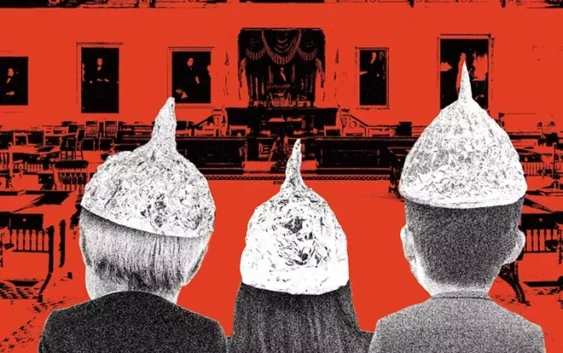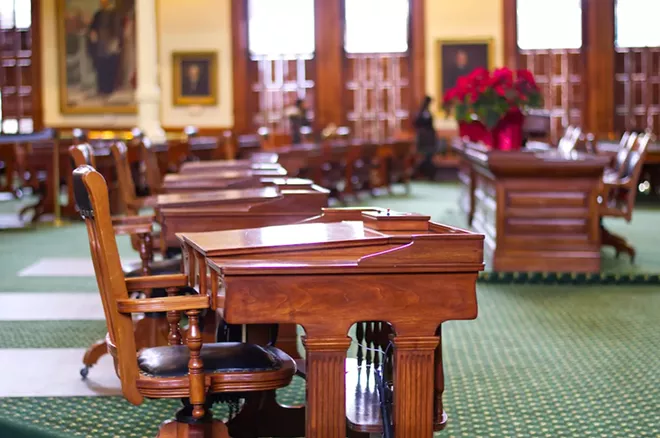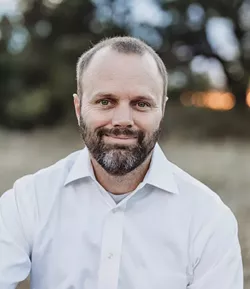- They couldn’t save their daughters’ lives in the July 4 floods. Now they’re dealing with the grief and the guilt.
- Austin could see heavy rains, possible flooding over the next few days
- Families of campers, counselors who died in Texas Hill County floods sue Camp Mystic
- Small plane bound for Jamaica with hurricane relief supplies crashes in Florida neighborhood
- Ask the Meteorologist: Did a tornado hit Johnston County Saturday night?
Capitol Conspiracies: Texas Republicans are flooding the session with bills based on online hoaxes

Illustration by David Loyola
This legislative session, GOP lawmakers have filed bills based on debunked online claims, including the allegation that some public schools allow students to go to the bathroom in litter boxes.
If it seems the Texas Legislature is debating an awful lot of bills this session that would be more appropriately discussed in an internet chat room, you’re not wrong.
This session, lawmakers have filed more than 30 bills to address “vaccine freedom,” including one that would outlaw mRNA COVID-19 vaccines. Another would require the Texas Department of Health and Human Services to provide blanket vaccine exemptions, and a third would prohibit the state health department from collecting vaccine data information by ZIP Code.
All this while Texas experiences its worst measles outbreak in three decades.
Other bills, including the high-profile HB 5337, would make it more difficult for undocumented migrants to vote — something that’s already illegal and elections experts say almost never happens.
Yet those aren’t even the most bizarre pieces of legislation Republican lawmakers have filed this session.
Last week, the Texas House Committee on Public Education’s debate of the “Forbidding Unlawful Representation of Roleplaying in Education,” or FURRIES Act, drew both headlines and online ridicule. That proposal would ban students from “meowing or barking,” wearing leashes or other accessories designed for pets, licking oneself as a manner of grooming, and perhaps most bizarrely, “using a litter box” on campus.
Despite the specificity of its language, the bill’s author, state Rep. Stan Gerdes, R-Smithville, couldn’t provide evidence that any Texas public school district is providing litter boxes to students when questioned by fellow state Rep. James Talarico, an Austin Democrat.
“I find it disturbing that these types of debunked conspiracy theories are being used by politicians at the highest levels of government, including this legislature, who know they’re incorrect,” Talarico told Gerdes.
Talarico isn’t alone in questioning why a flood of bills that originate from far-right, online conspiracy theories have made their way into the Texas Capitol for serious debate.
Althea Delwiche, a professor at San Antonio’s Trinity University who specializes in digital media and political propaganda, offered possible explanations why they’re consuming so much oxygen in Austin this session.
“There was a framework that determined truth and falsehood and acceptable opinions versus unacceptable opinions that was constructed by institutions like the mainstream media,” Delwiche told the Current. “That framework has been under steady assault for the past 10 years in this country.”
While both the American right and left engage in their share of conspiracy mongering, observers said Texas Republicans have showed an alarming propensity to grab onto far-fetched online claims in a bid to throw red meat to their most extreme voters.
“I think that this change in the Texas Republican party has been ongoing, at least for a dozen years,” Southern Methodist University political scholar Cal Jillson said. “The Tea Party Movement was the beginning of it, and it spiraled from there.”
Although some bills based on baseless online conspiracies are harmless, experts warn that other legislation promoted by lawmakers could hurt the largely disenfranchised groups they target.
During the recent debate on furries in schools, Democratic lawmaker Talarico scolded bill author Gerdes and Gov. Greg Abbott for latching onto spurious online claims in an attempt to smear teachers and public school employees.
“It’s not just you,” Talarico said. “Gov. Abbott has used this litter box rumor to paint our schools in the worst possible light. He even used the litter box conspiracy theory to push his private school voucher bill. So, I think that’s because if you want to defund neighborhood schools across the state, you have to get Texans to turn against their public schools. So, you call librarians groomers. You accuse teachers of indoctrination, and now you say that schools are providing litter boxes to students. That’s how all of this is tied together.”
Chasing vapor trails
Among the conspiracy-oriented legislation filed this session that experts say is an exercise in political grandstanding is House Bill 1382.
Filed by freshman Rep. Wesley Virdell, R-Brady, the proposal would outlaw weather modifications, including “the injection, release, or dispersion” of chemicals with the intent to alter the climate and the intensity of sunlight.
In other words, the bill targets the so-called “chemtrails” tin-foil hat types claim are poisoning unwitting Americans. In reality, those long-lasting streaks in the sky are actually condensation trails left behind by high-flying aircraft, according to scientists.
“This is probably not a bill that you would normally see come before your committee. I had several constituents in my district ask me to file a bill related to this,” Virdell said while introducing his proposal during a House Licensing Procedures Committee hearing on April 22. “There’s a lot of concern that the federal government has been actively modifying our weather through geothermal engineering, and so this bill is just to prohibit that.”
For reference, “geothermal engineering” is the broad term for using underground temperature sources — steam from hot springs, for example — to generate electricity. On the other hand, the phrase “geo-engineering” describes human tinkering with weather patterns, the issue Virdell’s bill purports to address.

Shutterstock / JC Gonram
“I think that this change in the Texas Republican party has been ongoing, at least for a dozen years,” Southern Methodist University political scholar Cal Jillson said. “The Tea Party Movement was the beginning of it, and it spiraled from there.”
While experimental technologies such as direct air capture or sunlight-reflecting aerosols may one day be able to modify the weather, experts say those are in their infancy and not being weaponized by the federal government.
Regardless, more than a dozen speakers, including Hill Country orchard farmer Gregory Porter, explained to lawmakers why they urgently needed to pass Virdell’s bill. During their testimony, they relied not on actual science but personal observations that often bordered on the absurd.
“Two to three times a week, what we’ve begun to see is these planes coming by and creating these grid patterns,” Porter testified. “I started to do some research on this, and what ultimately happens over the course of the afternoon is these stripes turn into a really thin layer, and it creates a haze.”
Porter said that, after doing more research on the mysterious haze, he uncovered “shocking evidence” that government agencies, including NASA and an unnamed “global organization” have detailed plans to block solar radiation using “neurotoxic metals.”
Elizabeth Stephens, a mother of three and six-year-old boys, blamed chemtrails for her children’s health problems.
“Both of my boys spend hours outside. Like, six hours a day,” Stephens told the committee, sobbing. “And, whenever they come inside, they cough. These should be healthy kids, they should not be coughing.”
Stephens showed off a stack of photo evidence she said backs up her claims.
“You can control what you can control in your house but you can’t control the skies,” she said.
Upon further questioning by lawmakers, Stephens clarified that her children’s cough “comes with the seasons,” suggesting seasonal allergies might be a more likely explanation than a shadowy government conspiracy.
Seeding uncertainty
During the bill’s debate, some members of the committee appeared confused about how the bill would affect the only weather modification instrument actually used in Texas — cloud seeding.
The Texas Department of Licensing and Regulation (TDLR) actually issues permits to entities, including groundwater conservation districts, to alter the weather via the process, which has been in use for decades.

Courtesy Photo / Wes Virdell for State Representative
Texas Rep. Wesley Virdell is a Republican from Brady.
Six licenses have been issued, and two are in the process of being renewed, according to state officials. However, Steven Leary, TDLR’s assistant general counsel, said none of those licenses are for geoengineering, the bogeyman Virdell aims to shut down with his bill.
“The [geoengineering] thing is different,” Leary said. “Solar geoengineering is a concept about … using technology to dissipate the effects of global warming. That’s why it’s become a political hotbed issue.”
TDLR hydrologist Chris Hooyboer explained that cloud seeding in arid parts of Texas uses non-toxic particles that are dispersed prior to storms in the hope that more rain will occur, helping prevent or reduce drought conditions.
“They are essentially introducing particles that allow the formation of water droplets to produce rain, which will then fall in the target area that we have assigned them on the permit,” Hooyboer said. “But, it’s not supercharging the storm cell to then wreak havoc on the rest of the state.”
The kind of confusion that reigned during the debate of Virdell’s bill is the result of conspiracy theories and half-truths being supercharged in an echo-chamber media landscape, Trinity’s Delwiche said.
Real world consequences
Although it’s tempting to write off the debate of such issues as laughable, the professor warned that the willingness of lawmakers to play along for political points can have dire consequences.
“[Conspiracy theorists] don’t care about whether or not it is truthful in a real sense,” Delwiche said. “They care about whether it gives them enough ammunition for what they want to believe. They’re not asking for logical, well-reasoned arguments, and I think there are many craven leaders out there who are quite willing to work with that.”
In the end, the Texas Legislature’s weather modification bill was tabled for later discussion, and it’s questionable whether it will gain any further traction. However, other conspiracy-based legislation now under consideration can have real-world consequences.
For example, House Bill 5337, introduced by Rep. Carrie Isaac, R-Dripping Springs, would require people who register to vote in Texas to first provide proof of U.S. citizenship through a birth certificate or passport. It also goes even further by retroactively applying the requirement to the 18 million Texans already registered to vote.
The bill is loosely based on the widely debunked conspiracy theories spread by President Donald Trump that the 2020 election was stolen, in part, by undocumented immigrants voting.
However, voting-rights advocates, including the Texas ACLU and VoteRiders, warn that the bill would disenfranchise low-income Texans who can’t afford a passport or don’t know where or how to obtain a copy of their birth certificate.
“Texas already has effective safeguards to ensure our voter rolls only contain eligible voters,” VoteRiders’ Texas State Director Vicente Martinez said in a statement. “We do not need to create new, burdensome, and expensive requirements for all voters to prove they are eligible.”
Although the proven incident rate for voter fraud is well below 1% nationally, that hasn’t stopped Republicans from capitalizing on the issue.
“You can say things like that the election was stolen, but anyone who is in contact with real information knows that to be bad information,” SMU’s Jillson said.
Even so, the rise of the alternative news eco-system and constant attacks on the mainstream media by Trump and other Republicans ensure conspiracy-oriented bills will continue to make regular appearances before legislators in Texas and elsewhere, experts said.
“It’s really difficult to convince somebody that their ideas are not true when they reject all of the sources that you’re pointing to as an example,” Trinity’s Delwiche said.
Subscribe to SA Current newsletters.
Follow us: Apple News | Google News | NewsBreak | Reddit | Instagram | Facebook | Twitter | Or sign up for our RSS Feed
